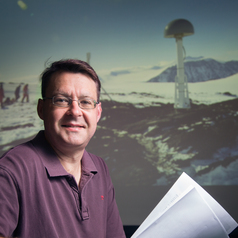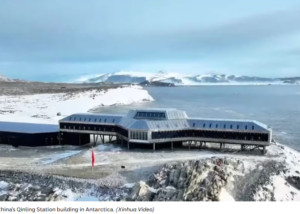Following an “emergency summit” of Polar scientists in Australia, renowned expert Professor Matt King: tipping points in Antarctica and the Southern Ocean could re-arrange the world. Plus “Recovering neuroscientist” and climate sleuth Clayton Aldern on his new book “The Weight of Nature – How a Changing Climate Changes Our Brains”.
Listen to or download this Radio Ecoshock show in CD Quality (57 MB) or Lo-Fi (14 MB)
ANTARCTIC TIPPING POINTS
MATT KING

University of Tasmania, Glacier researcher Professor Matt King.
Wed 11th Feb 2015
picture by Peter Mathew
Hidden from us all, huge changes are emerging at the bottom of the world: Antarctica. Hundreds of scientists just held an “emergency summit” in Australia. Just out a new paper: “Cascading tipping points of Antarctica and the Southern Ocean” – published December 10th. Extinction-level global changes could start there, “Down Under”.
Professor Matt King is a renowned Australian scientist specializing in polar geodesy and Antarctic research. He is currently a Professor at the University of Tasmania and Director of the Australian Centre for Excellence in Antarctic Science. (ACEAS)
Listen to or download this 26 minute interview with Matt King in CD Quality or Lo-Fi
Here on Radio Ecoshock we cover tipping points a lot, including with Tim Lenton. Listeners may be concerned with a slow-down in the Gulf Stream/AMOC – or the end of the Amazon rainforest. Australian scientist Matthew England suggested a deep Antarctic current might have tipped already. But until this new paper, most of us think of Antarctica as a long-term story, unwinding over centuries. Now science finds critical tipping points in the Southern Ocean as well.
Our interview with Matt King covers this breaking science paper, published 10 December 2024: “Cascading tipping points of Antarctica and the Southern Ocean”. It is Open Access, free for you to read. The Lead Author is Ida Kubiszewski et al with Matt King as a co-author.
Eight tipping points are described, most of them new to the public. I got stuck on the possibility that Antarctic Bottom Water might stop circulating. According to this paper:
“These currents deliver nutrients heat, and salt globally, supporting roughly 75% of biological production north of 30°S[outh]”
Basically, the ocean food chain in the rest of the world could lose up to three quarters of it’s food. And we would not even know it happened until decades or even centuries later. That sounds like a bad trap. Even worse, these tipping points do not happen in isolation. One southern tipping point can trigger others possibly leading to a cascade of irreversible changes at the Pole, and for the whole planet.
By the way, our guest Matt King is a Polar Geodesy at the University of Tasmania. I admit it. I had to look up Geodosy. It is the science of measuring the Earth’s shape, orientation, and gravity field. As Antarctica (or Greenland) loses ice mass, it slightly changes gravity and even the shape of the Earth. Among many other things, geodesy can help tell us how much ice is being lost there. Matt explains more applications of Geodesy to Polar science in our interview. Fascinating stuff.
THE RECENT ANTARCTIC “EMERGENCY SUMMIT”
“Runaway ice loss causing rapid and catastrophic sea-level rise is possible within our lifetimes.”
Billed as an “emergency summit” The 2024 Australian Antarctic Research Conference was held November 19 to 22nd at the University of Tasmania in Hobart.

Of the 450 scientists at the Conference, about two thirds are younger researchers. They put out a warning statement on Antarctica and the Southern Oceans. They cite “record-low sea ice, extreme heatwaves exceeding 40°C [72°F] above average temperatures, and increased instability around key ice shelves.”
Adding just a few tips from the early career Antarctic researchers:
“The East Antarctic Ice Sheet alone holds enough water to raise global sea levels by approximately 50 metres if completely melted.” Note: the global sea level has risen by up to 10.5 centimeters (over 4 inches) in the past 30 years.
“The services of the Southern Ocean and Antarctica — oceanic carbon sink and planetary air-conditioner — have been taken for granted.”
“Recent research has shown record-low sea ice, extreme heatwaves exceeding 40°C above average temperatures, and increased instability around key ice shelves.”
READ the Early Career Polar scientist’s statement here.
ABC News Australia covered the conference in this YouTube video.
ABC News did creditable reporting about the conference held in Australia. Australians follow Antarctic news and developments as people in the North follow the Arctic. Neither talks to each other as they should. When Antarctic meltwater dwarfs runoff from Greenland – and raises sea levels well above our cities and airports, then the world “global” in global sea level rise tells us: we must be able to see changes and threats at both Poles. News from Australian media needs to reach northern listeners who are often kept within bubbles of national news.
In a 2023 paper Siegert et al say: “It is well documented how such events have impacted society outside Antarctica through enhanced levels of rainfall and flooding, heatwaves and wildfires, drought and water/food shortages and episodes of intense cooling.”
Runaway ice loss causing rapid and catastrophic sea-level rise is possible within our lifetimes. Whether such irreversible tipping points have already passed is unknown. Just like the rest of the world, extreme events are happening in Antarctica – they are just not in the news.
New ecosystems will appear in Antarctica as ice disappears from both the sea and on land. A new part of the planet is being revealed to life – or perhaps returned to life after many millions of years. Antarctica has been frozen for at least 14 million years, and maybe as long as 38 million years. About 100 million years ago the continent was part of supercontinent Gondwana. It was covered in forests, ferns, conifers, and flowering plants. But a modern life ecosystem will appear on “new” ground and open sea as Antarctic ice retreats.
THE EIGHT POLAR TIPPING POINTS CONSIDERED…
* two physical (ice sheets, and ocean circulation),
* three biological (species redistribution, invasive species, and permafrost),
* two chemical (ocean acidification and pollution), and
* one social (Antarctic Treaty System) tipping points in Antarctica
ANTARCTICA IS A BUSY PLACE – GEOPOLITICS
China has established five research stations in Antarctica, with the latest being the futuristic Qinling Station, opening in February 2024. There are over 70 permanent research stations in Antarctica, operated by more than 29 countries. Australia has four. Argentina: Has 13 stations. Japan, Pakistan and Bulgaria are there.

Russia claims the world’s largest oil and gas reserves in the UK’s zone of interest in the Antarctic. At 511 billion barrels it is far more than Venezuela’s 300 billion in reserves. If this oil and gas is drilled and burned, the climate for mammals is over. One expert concludes Russia will not attempt to break Antarctic norms and treaties in its current weakened state – and the very high cost of technology to survive Antarctic conditions.
We shall see. It’s a wild west down there in Antarctica. Some countries claim territories, others ignore the claims and build bases where they want. The last safe space for peace and science is always at risk. Stay tuned to Radio Ecoshock for more news on Antarctic tipping points that could change the world.
* PLEASE SUPPORT THIS RADIO OUTREACH IF YOU CAN *
We are fortunate to have advertising-free radio stations for community-building in several democracies – at least for now. Over 100 of them broadcast this program every week, passing on science, reality, and alerts. So far, no aspiring autocrat has shut us down. No corporation can tell us what to say, or make me keep quiet (other than libel laws). Radio Ecoshock is listener-supported. You are the boss!
Strange to say, it takes almost 40 hours a week for me to track new science, line up busy authors, prepare this one-hour program and ship it out using several different services. I am not going to die (I hope), or give up, if you do not send a donation. I will be greatly encouraged and relieved if you do.
You can donate any amount, or sign up for a low-cost monthly donation, using Paypal here. The show address is also there for people who prefer to send either a check or an international money order. Note: U.S. Postal money orders can only be cashed in the United State – but my studio is in Canada, a few miles east of Vancouver. An international money order is needed.
Either way, a grand thank you to all those who have kept me going this far, every week for the past 19 years! More is needed.
****************
CLIMATE AND YOUR BRAIN
CLAYTON ALDERN

Can climate change alter our brains? Yes, in many ways, says Clayton Aldern. Clayton is a a neuroscientist turned environmental journalist. He holds a Master’s degree in neuroscience and a Master’s in public policy from the University of Oxford. Clayton’s work appears in major publications and he is a senior data reporter at Grist. After seven years of digging, Aldern just released results in a new book “The Weight of Nature – How a Changing Climate Changes Our Brains”. Let’s explore.
Listen to or download this 33 minute interview with Clayton Aldern in CD Quality or Lo-Fi
Paper after paper documents increasing aggression in the heat, even down to how soon people honk their horns in traffic frustration on hot days. It is not just humans who become more aggressive with every degree of extra heat. Aldern finds this in fish, spiders, ants, and primates.
How extreme heat from climate change distorts human behavior
But I could find no studies or statistics showing an increase of violence, assaults, or domestic incidents during the super heat dome of late June and early July 2021 in the Pacific Northwest. My question: is it possible there are levels of heat where humans are simply too wiped out and unable to respond with violence?
In the interview we discuss all sorts of ways climate change can lead to bad changes in our brains. You know mosquito-born diseases, like Dengue Fever, are already moving north with the heat. Aldern’s book dives into changes in blue-green algae blooms increasing along with carbon dioxide and global temperatures. The algae can poison drinking water, especially fresh-water.
There are also traces incriminating climate change in growing rates of Parkinson’s and ALS or Lou Gehrig’s disease. This fits in nicely with our recent interview with the work of Dr. Jennifer Balch showing breathing wildfire smoke can increase dementia risk by 18%.
A SAMPLE FROM THE BOOK
“Sometimes the world offers more than a nudge: Sometimes it pushes further, and sometimes you are changed forever. The ragged trauma of a hurricane, wildfires that melt people – the interior demons that check in to the motel of your mind and never leave, and somehow convince you to pick up the tab. There is the abyssal depression that descends with landscape loss; the cortex-rotting diseases provoked by warming waters. There are, with us now, brain- eating amoebae and plummeting test scores and the shrunken brains of chronic stress. All this and more. What I am trying to say is: The horrors are not out there. The horrors are inside.”
AND IT’S HARD TO THINK STRAIGHT IN THE HEAT
“Evidence emerged like a gnat cloud. Air pollution slowed down everyone from pear packers to call- center workers. Higher temperatures tanked students’ math scores, even when correcting for location and family wealth and, importantly, when comparing kids to themselves at different points in time (as opposed to one another) – one of the best statistical controls we have. During a heat wave in Boston, researchers showed that college students in dorms without air-conditioning performed cognitive tests with 13 percent slower reaction times than students living in air- conditioned buildings. There wasn’t a toxin to speak of, just the poison of heat.”
– The Weight of Nature, Clayton Aldern
THE UNBORN VICTIMS OF HURRICANE SANDY
From Aldern’s “Weight of Nature”: “Yoko Nomura’s study is even more stunning….What she showed in late 2022, in a ten- year look back on Superstorm Sandy, is that children in Sandy’s path who were in utero during the storm now carry a severely disproportionate risk of psychiatric conditions, relative to kids born before the storm or who were conceived after it.
Compared to girls who were spared from the storm, for example, girls who experienced Sandy in utero saw a twenty- fold increase in anxiety and a thirty- fold increase in depression. Boys saw a sixty- fold increased risk of ADHD and a twenty- fold increase in conduct disorder. Symptoms presented as early as preschool. “
Many of us scan feeds of news showing climate-related events. Cars float down suddenly-flooded streets. A hurricane or a wildfire wipes out a town. Extreme events get a lot of hits and views. Do you think this diet of bad news physically changes our brains?
Do we all have some degree of Post Traumatic Stress Disorder these days? If so, what does that mean for long-term public health? One of my deeper fears: with a combination of disease, stress, and climate factors, there could be millions of people needing care due to mental disability and cognitive decline. That is beyond any medical system. It could take humanity into a darker time. Maybe neuroscience will find some protection or solutions, a kind of brain health vaccine or pill…
CLIMATE IS WHO WE ARE
In the book, Aldern also outline a basis for our identity – who we think we are – that depends on minimizing surprises. To do it, we collect everything we can to maximize evidence for our worldview. As I see it, for a solid corporate motorist to change their worldview enough to save the environment, they would have to abandon the mental model they use to exist. They would have to die a little inside. Few people are willing to do that. That may function as an internal barrier to accepting the reality of climate change.
Aldern looks into “mindful presence” as a coping mechanism, maybe slowly healing, for climate-related PTSD. He also considers storytelling. Perhaps if we turn our anxiety into art, into writing, into radio, our brains are trying to heal?
Look for his new book “The Weight of Nature – How a Changing Climate Changes Our Brains”. Find links and more info to follow up in my weekly show blog at ecoshock.org. Find Clayton at www.claytonaldern.com

==============
CLOSING NOTES
Next week, for the alleged “Holiday Season” I hope to rummage through years of climate songs for the best green music – plus a collection of new AI-enhanced music developed for Radio Ecoshock shows. It may not be happy, but it will be a holiday. Then we return with more blistering science and issues in the new year of 2025. Scientists already predict it will be a hot one. No surprise there.
I’m Alex. Don’t forget to donate! Thank you for listening, and caring about our world.
Pingback: The polar playground for a suicidal species? - The Australian Independent Media Network